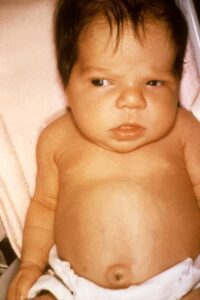Types of Jaundice
Pre-hepatic Jaundice
- Occurs when the body produces excessive bilirubin, and the liver is unable to process it.
- Bilirubin builds up in tissues, causing yellowing of the skin.
Hepatic Jaundice
- Caused by liver damage, which prevents the liver from filtering bilirubin from the blood.
Post-hepatic Jaundice (Obstructive Jaundice)
- Occurs when bile flow is blocked, preventing bilirubin from draining into the digestive system.
Causes of Jaundice
Pre-Hepatic Jaundice
- Hemolytic anemia
- Malaria
- Defective hemoglobin structure
- Dyserythropoiesis
Hepatic Jaundice
- Cirrhosis
- Viral infections (e.g., Hepatitis)
- Liver cancer
- Bacterial infections (e.g., Leptospirosis)
- Wilson’s disease
- Alpha-1 antitrypsin deficiency
Post-Hepatic Jaundice
- Tumors
- Gallstones
- Liver disease
- Pancreatitis
- Biliary Atresia (a condition where bile ducts are narrow or absent)
Symptoms and Features of jaundice
Pre-Hepatic Jaundice
- Yellowing of skin, eyes, and mucous membranes
- Itchy skin
- Dark urine
- Pale stools
- Swollen abdomen
Hepatic Jaundice
- Nausea
- Vomiting
- Weight loss
- Fever
- Chills
- Yellowing of the skin
Post-Hepatic Jaundice
- Pruritus (itching)
- Bloody nose
- Muscle and joint pain
- Cancer
- Cholestasis
Diagnosis and Tests for jaundice
- Normal serum bilirubin levels are less than 1 mg/dl. Jaundice becomes clinically noticeable (scleral icterus) when levels exceed 3 mg/dl.
Tests:
- Liver Function Test (LFT) – To check serum levels of AST, ALT, ALP, serum albumin, protein, and bilirubin.
- If AST, ALT, and ALP levels are normal, the jaundice is likely not due to liver or bile duct injury and may be pre-hepatic in origin.
Treatment Options for Jaundice
- Treatment depends on the cause and the patient’s age.
- For children:
- Phototherapy
- Exchange transfusion
- Discontinuation of breastfeeding
- For adults:
- Surgery for obstructive jaundice
- Cholestyramine (for itching)
- Iron supplements (for anemia)
- Antibiotics (if necessary)
- For children:
Prevention
- Limit alcohol consumption within recommended guidelines.
- Maintain a healthy weight.
- Avoid using natural or herbal supplements without medical advice.
- Manage cholesterol levels effectively.
Additional Information
Jaundice can also result from various congenital and genetic disorders, such as:
- Dubin-Johnson syndrome
- Rotor syndrome
- Wilson’s disease
- Gilbert syndrome
- Crigler-Najjar syndrome Types 1 and 2

